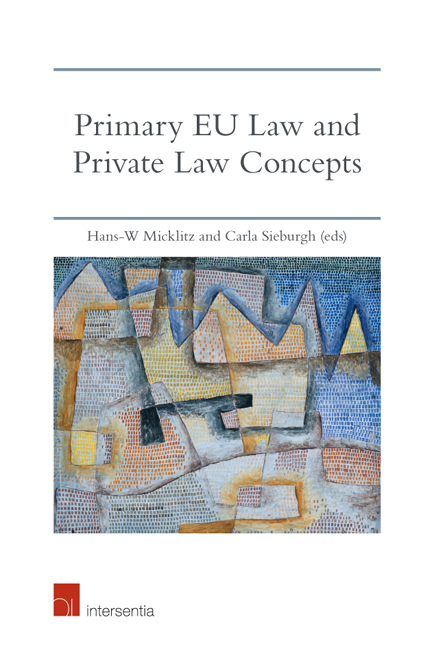Book contents
- Frontmatter
- Preface
- Summaries of the Chapters
- Contents
- Table of Cases: Alphabetical
- Table of Cases: Chronological
- List of Authors
- Chapter 1 Primary EU Law and Private Law Concepts
- Chapter 2 The Impact of Free Movement of Goods and Services on Private Law Rights and Remedies
- Chapter 3 The Impact of Free Movement of Capital on Private Law
- Chapter 4 The Impact of Competition Law on the Private Law Concepts of Nullity and Damages
- Chapter 5 The Impact of Article 101(2) TFEU Nullity on Private Law
- Chapter 6 The Impact of EU State Aid Law on National Private Law
- Chapter 7 The Impact of EU Intellectual Property Law and the Charter on Private Law Concepts
- Index
Chapter 4 - The Impact of Competition Law on the Private Law Concepts of Nullity and Damages
Published online by Cambridge University Press: 27 September 2018
- Frontmatter
- Preface
- Summaries of the Chapters
- Contents
- Table of Cases: Alphabetical
- Table of Cases: Chronological
- List of Authors
- Chapter 1 Primary EU Law and Private Law Concepts
- Chapter 2 The Impact of Free Movement of Goods and Services on Private Law Rights and Remedies
- Chapter 3 The Impact of Free Movement of Capital on Private Law
- Chapter 4 The Impact of Competition Law on the Private Law Concepts of Nullity and Damages
- Chapter 5 The Impact of Article 101(2) TFEU Nullity on Private Law
- Chapter 6 The Impact of EU State Aid Law on National Private Law
- Chapter 7 The Impact of EU Intellectual Property Law and the Charter on Private Law Concepts
- Index
Summary
INTRODUCTION
Competition law and contract law have been traditionally regarded as independent areas, with limited interactions. While sharing some common objectives and functions such as promoting economic freedom, the two areas fulfil different roles in regulating commercial activity and the behaviour of market actors. However, in practice EU competition law seems to have an increasingly major impact on private law, as a number of key cases of the European Court of Justice (‘Court of Justice’) have indicated. This influence may sometimes conflict with national principles, creating tensions which are in turn stimulating new legal developments.
This chapter analyses the intersections between EU competition law and contract law, focusing mainly on Article 101 of the Treaty on the Functioning of the European Union (TFEU), which has a private law dimension and can directly affect the validity of anti-competitive agreements. A number of key competition law cases will be assessed to explore how recent court rulings have influenced and shaped private law concepts, such as nullity of unlawful contracts, damages and the protection of the weaker contractual party.
This chapter first examines cases where the court clarified the notion of contractual nullity in competition law disputes. While nullity is an important remedy in competition law, a comprehensive analysis of its influence on national law, which takes into account the intricate relationship between effective competition and contractual freedom, is still lacking. This chapter aims to shed some light on this issue, assessing the concept of nullity developed by the Court of Justice and its effects on national law.
A second topic treated in this chapter is the right to claim damages and the principle of effective protection in EU case law. Particular attention will be given to the multi-party dimension in the seminal Courage and Manfredi cases and the impact of these cases on national law, assessing new legislative developments.
The chapter concludes by arguing that the Court of Justice has actively shaped the concepts of nullity and damages in competition law disputes, leaving it to Member States to determine the consequences of unlawful contracts within the realm of Article 101 TFEU. As a result, the effects of invalid contracts differ considerably depending on the jurisdiction and the particular circumstances of the case.
- Type
- Chapter
- Information
- Primary EU Law and Private Law Concepts , pp. 133 - 164Publisher: IntersentiaPrint publication year: 2017

